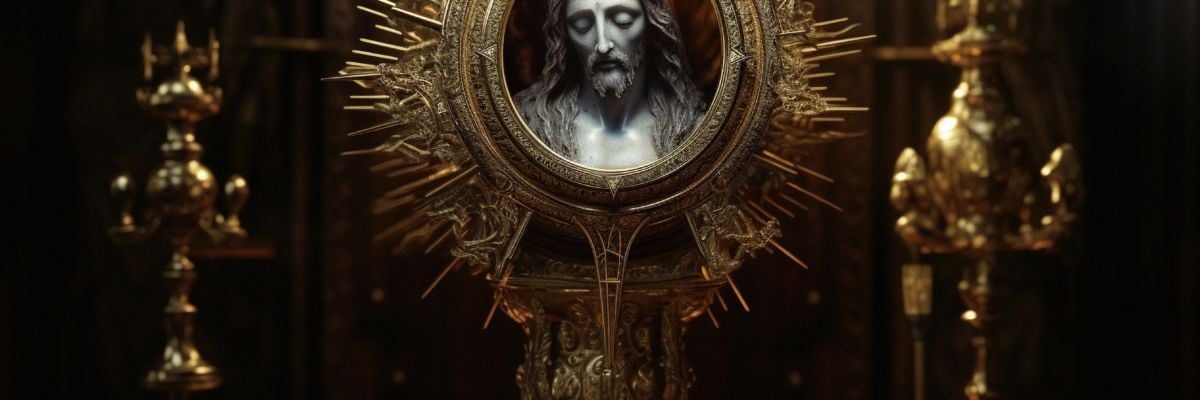
Catholic apologist Karlo Broussard joins host Thomas Graf to help a caller answer a key question from a Protestant colleague: Where does the Catholic teaching that Jesus is fully present—body, blood, soul, and divinity—in the Eucharist come from? Karlo traces the doctrine back to the words of Christ at the Last Supper and unpacks how St. Thomas Aquinas and Church tradition have deepened our understanding of this mystery. Discover how this foundational belief is rooted in Scripture and the theological reality of Christ’s unified human and divine nature.
Transcript:
Caller: I would love to be able to explain to my Protestant colleagues where the doctrine that the Eucharist is not just the body and blood of our Lord, but also his body, blood, soul, and divinity, the origin of that doctrine. Can you help?
Karlo: Yeah, great question, Jan. So it’s pretty much rooted in the theological principles that are embedded in the revelation of the Eucharist at the Last Supper. St. Thomas Aquinas talks about this in some pretty technical jargon and language that’s a bit complicated to read, but if you’re interested in rolling up your sleeves and trying to tackle it, you can check it out in his *Summa Theologiae*, the third part, question 76, article 1. And then he also talks about it in questions 78 and 79.
But here’s the gist of it, Jan. We know from the Last Supper that our Lord, by the power of the sacrament, right, makes his body present under the appearance of bread, because he takes bread and says, “This is my body” over the bread. Given the symbolism of the bread as nourishment for our spiritual life, it makes present what it’s signifying, namely, the flesh of Jesus, which He revealed to us that his flesh is the new bread from heaven, which is going to spiritually nourish us as we journey to the promised land of heaven.
But here’s the theological key, Jan, to your question. Wherever the body of Jesus is, there you’re gonna have the soul and blood of Jesus along with his divinity. Because all of those other elements of Jesus, if we can use that term loosely, are united to his body. Because when Jesus makes His body present, he’s with. United with his body is his blood and soul, precisely because that’s his human nature.
It’s not as if Jesus is dividing these different parts of himself, because as he exists there at the Last Supper, he exists in the fullness of his human nature. His body’s there, his blood’s there, and his soul is there, united together in his human nature as he’s present. So whenever he makes his body present with the apostles, united to his body and blood, because he has his human nature. And whenever, so too, when he makes his body present in the Eucharist, well, his blood and his soul are going to be present too, because that’s how he’s existing at that moment when he offers the Eucharist.
Now, His divinity is going to be united to it as well. Because in the person of Jesus, you cannot separate his humanity and his divinity, because both are joined in the single person, the Word of God, the second Person of the Blessed Trinity.
And so this is kind of sketching and summarizing here, St. Thomas Aquinas’s theological reflection. Wherever the body of Jesus is at the moment Jesus is offering the Eucharist, you have united to it his blood and his soul, because his human nature is there. And then his divinity is going to be united to his human nature and to him as well, because you can’t separate his humanity from his divinity.
Now, I recognize that’s in the theological weeds and it’s a bit deep, but that’s the theological reflection that the Church has come up with on account of meditating on the divine revelation of Jesus offering himself in the Holy Eucharist. The bottom line here is that whatever condition Jesus is in when he’s offering the Eucharist at the Last Supper, he’s there. Body, blood, soul, and divinity, so too will be the condition of the Eucharist.
If his body is made present in the power of the sacrament, so do his blood, his soul, and his divinity. When his blood is made present under the appearance of wine, that’s what Aquinas calls the power of the sacrament. “This is my blood.” Well, then you’re going to have his body and his soul united, because his body and his soul are united to his blood as he’s sitting there in the presence of the apostles. And you’re also going to have his divinity united to it as well, because you have his humanity and you can’t separate his humanity from his divinity in the person of the Word.
So that’s the sketch, that’s the general explanation. Hopefully, that sheds at least some light in the darkness of this mystery.
Karlo: What do you think, Jan? How did that do?
Caller: Oh, my gosh. I think that’s a beautiful explanation, and I’m excited to both think about it and to try to go out and reproduce it to people who have. Thank you. Good luck with that.
Karlo: You’re welcome, Jan. Here’s one more element that may help a little bit. Again, this is rooted in the theological reflection on the revealed data. Notice how I said whatever condition Jesus is in when he offers the Eucharist, that’s going to be the condition of the Eucharist, if we can use those terms loosely.
Think about it like this. Whenever we offer the Eucharist, whenever a priest consecrates the Eucharist, what we have in the Eucharist is the condition of Jesus right now. So the body that we receive in the Eucharist, so St. Thomas Aquinas argues, is the glorified body of Jesus along with his soul and his blood, because that’s united to his glorified body in heaven right now, and of course his divinity.
But at the Last Supper, when Jesus offers the Eucharist, St. Thomas Aquinas argues that the body is made present in the Eucharist according to the condition of his body at that moment, which wasn’t glorified yet, along with his soul and his blood, because his soul and his blood are united to his body there. So that kind of illustrates what Aquinas is getting at.
Whatever condition of Jesus’s body, whatever condition Jesus is in at the moment the Eucharist is offered, that’s going to be the reality of the Eucharist. So that’s at least the theological explanation as to why Jesus’s blood, soul, and divinity are going to be present whenever his body is made present.
The fancy theological term for this, St. Thomas says, is concomitance. That means accompanying or attending with existing together. So whenever you have body made present together with body because of the union with the body, you have his soul and blood along with his divinity.
Cy: Jan, thanks so much for that call. If that’s not enough, then I don’t know what is. Carlo gave you just about emptied the tank on that answer for you. So thank you so much for calling in. Call in again anytime you like.



